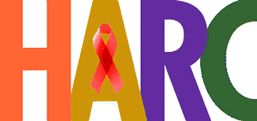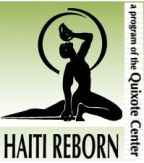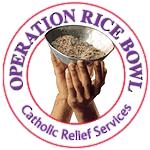
|
from St. Francis Parish, Ann Arbor
HARC (HIV/AIDS Resource Center) www.r2harc.org Komisyon Fanm Viktim Pou Viktim/KOFAVIV The Commission of Women Victims for Victims at: haitireborn.org www.haitireborn.org/our_programs/KOFAVIV The Commission of Women Victims for Victims (KOFAVIV) is a group of women who were victims of rape during Haiti's 1991-94 coup dtat. With their own experiences and knowledge of the community, these valiant women sought out new victims of rape. Most were raped by masked men, so could not identify their attackers. Most had been robbed, and many had lost their homes and all of their possessions. Some were pregnant and very few had access to medical treatment following their rape. KOFAVIV knew that its resources were limited and it needed to respond to the most urgent needs first. It identified emergency medical assistance as the most critical need. KOFAVIV created an emergency medical assistance project. Knowing they would not benefit from the program themselves, the women organized a project for new victims to receive health care and to participate in a series of group training sessions. Putting together a health care project was a major undertaking. KOFAVIV began a contract with a clinic in Port-au-Prince on March 8, 2005. This contract allowed for up to 50 new victims to be seen each month. KOFAVIV developed an internal criteria for eligibility for services. KOFAVIV found that victims who had been attacked within the last three months would be eligible; others would be referred elsewhere for treatment. A doctor contracted by ODEPS is available to see the women, and medicines are provided free of charge (the cost of drugs is not included in the contract). Victims are tested and receive treatment for sexually transmitted diseases, including AIDS, infections, and other conditions related to rape. Victims who arrive immediately after their rape are given a prophylaxis against HIV as well as emergency contraception to prevent pregnancy. Women who become pregnant as a result of a rape or were pregnant at the time of their rape receive treatment for the duration of their pregnancy. (* This does not include voluntary abortions, which are illegal in Haiti.) In August, the first two deliveries were performed for victims of the commission. All services, including medical costs for delivery, are free of charge. During the first month period, they provided medical care for over 80 victims. In order to meet the stipulations of the clinic KOFAVIV changed its internal criteria for referrals and decided only victims raped within one month of referral would be allowed treatment at the clinic. Other victims continued to be referred elsewhere. While KOFAVIV has been able to provide much-needed assistance to many
women victims, it confronts major obstacles that have yet to be resolved.
Victims who are seen within a 72-hour window following rape require post-exposure
prophylaxis to prevent the transmission of HIV/AIDS. KOFAVIV has not yet
been able to procure antiretrivoral (ARV) therapy for these cases and therefore
must refer victims eligible for this treatment to one of two centers in
Portau- Prince providing it. The second major obstacle is the lack of sufficient
funds to provide care for victims who come more than a month after being
raped. The personalized approach and mechanisms to ensure that victims
will receive follow-up care do not exist at other centers, and many victims
referred to these locations do not receive adequate medical care. Also,
it is more difficult to incorporate these victims into other activities
of the Commission. These problems have illustrated the need for KOFAVIV
to begin developing a longer-term strategy for the future that will allow
the group to provide more comprehensive services for all victims.
----------------------------------------------------
History of KOFAVIV In the months following the February 29 coup dtat against President Jean-Bertrand Aristide, the US installed government and its allies began a violent campaign of repression against supporters of the elected government. Known supporters of the Aristide government and the Lavalas political party were vulnerable to political persecution, but residents of the katy popil, or poor neighborhoods, were most affected by the wave of human rights violations. Hundreds of persons were victims to a full spectrum of violations of their rights in the immediate period following the departure of President Jean-Bertrand Aristide. At the same time, the capital experienced a dramatic rise in both physical and economic insecurity: incidents of general violence increased, the price of essential goods sourced, and many persons were illegally fired from their jobs. Despite heavy repression and insecurity, residents of neighborhoods including Cit Soleil, Bel Air, Martissant, Village de Dieu and parts of Carrefour continued to participate in demonstrations calling for the return of President Aristide and constitutional order. Repression in these neighborhoods further intensified in late fall 2004 when the HNP, accompanied by MINUSTAH (the United Nations Stabilization Mission in Haiti) began carrying out operations in poor neighborhoods. For most of the last eighteen months, the poorest neighborhoods of Port-au-Prince have been under constant violent attack. The population has suffered at the hands of the PNH, the MINUSTAH military forces, armed gangs from different political factions, resurgent members of the army and paramilitary, a well-organized kidnapping ring, and common criminals both opportunistic and escaped prisoners. Women have been victims of the same types of human rights violations and crime as menkillings, forced disappearances, assault, robbery, and arsonbut have also been vulnerable to gender-specific violations particularly rape. One of the most vicious and least known aspects of this siege on the poor has been the surge in cases of rape and politically-motivated rape. Hundreds of women have been victims of rape, which is often combined with robbery, assault, and/or murder of other members of the household and/or arson. The Commission of Women Victims for Victims (KOFAVIV) is a group of women who were victims of rape during the 1991-94 coup dtat. KOFAVIVs founders originally came together to prepare a landmark legal case against the perpetrators of political rape during Haitis 1991-1994 de facto dictatorship, including the regimes top military and paramilitary officials. Had the process not been interrupted by the February 29, 2004 coup dtat, this case could have set an international precedent as the first prosecution of top leaders for political rape by a domestic court. In Haiti, the case embodied womens vision of a society where justice, rather than impunity, is the norm. In the period following the February 29 coup dtat, the women of KOFAVIV watched in horror as political rape returned to their neighborhoods. The women remembered they had had little access to medical care, support, and other services when they were raped. Ten years later, they saw there were still few services available for poor victims and even fewer groups denouncing this surge in violations. Many well-established womens groups, led by middle and upper class women, had joined in the campaign to overthrow the elected government. Some womens group leaders even joined the new regime. Rather than responding vigorously to the new wave of violations against poor women, these organizations remained silent. The founders of KOFAVIV resolved that they would find a way to fill the void and effectively respond to the crisis facing poor victims. The Victim for Victim Approach With their own experiences and knowledge of the community, these valiant women found new victims of rape. Most were raped by masked men, so could not identify their attackers. Most had been robbed, and many had lost their homes and all of their possessions. Some were pregnant and very few had access to medical treatment following their rape. KOFAVIV knew that its resources were limited and it needed to respond to the most urgent needs first. It identified emergency medical assistance as the most critical need. KOFAVIV created an emergency medical assistance project. Knowing they would not benefit from the program themselves, the women organized a project for new victims to receive health care and to participate in a series of group training sessions. The Commission began with five commission members Eramithe, Malya, Solange, Ruth, and Elena. KOFAVIV put in place a network of twelve ajan kominot, or community-based human rights agents, located in several poor neighborhood of Port-au-Prince. The members and the agents conduct communitybased outreach to identify victims and refer them to the leaders of KOFAVIV, who complete files for them and then refer them for services. As of August 2005, the Commission had a total of thirty-three communitybased human rights agents. All ajan kominot receive ongoing training on how to approach victims and issues relevant to their work. Solidarity Groups Commission members offer informal peer-counseling and support. Each woman is invited to participate in a bi-monthly solidarity group meeting. KOFAVIV leaders employ the Wonn Refleksyon methods developed by the organization Beyond Borders to encourage nonhierarchical, participatory interaction and organization. This method permits people to understand each other better, and respect others. It encourages dialogue and self reflection, and helps with decision-making, explained one member. There are currently seven groups of 35-40 members meeting on a bi-weekly basis. KOFAVIV leaders serve as facilitators for these meetings. KOFAVIV also organizes large Espas Ouvri, or Open Space forums, on topics of interest to victims. Nearly 200 women participated in the first event on Women and Poverty in May 2005. While solidarity groups provide informal social and psychological support for victims of rape, KOFAVIV is looking to expand this project to provide more formal psychological therapy for victims. They are also seeking resources to hire a social worker/psychologist to conduct group support sessions. Medical Care for Victims Putting together a health care project was a major undertaking for KOFAVIV that was supported by its partners at KONPAY. KOFAVIV began a contract with the Organisation de lEntraide pour la Promotion Sociale (ODEPS), a clinic in Port-au-Prince on March 8, 2005. This contract allowed for up to 50 new victims to be seen each month. In order to meet the requirements of the contract, which is based on a calculation that ODEPS will see 50 victims per month, KOFAVIV was required to develop an internal criteria for eligibility for services. KOFAVIV found that victims who had been attacked within the last three months would be eligible; others would be referred elsewhere for treatment. A doctor contracted by ODEPS is available to see the women, and medicines are provided free of charge (the cost of drugs is not included in the contract). Victims are tested and receive treatment for sexually transmitted diseases, including AIDS, infections, and other conditions related to rape. Victims who arrive immediately after their rape are given a prophylaxis against HIV as well as emergency contraception to prevent pregnancy. Women who become pregnant as a result of a rape or were pregnant at the time of their rape receive treatment for the duration of their pregnancy. (* This does not include voluntary abortions, which are illegal in Haiti.) In August, the first two deliveries were performed for victims of the commission. All services, including medical costs for delivery, are free of charge. During the first month period, ODEPS provided medical care for over 80 victims. In order to meet the stipulations of the clinic KOFAVIV changed its internal criteria for referrals and decided only victims raped within one month of referral would be allowed treatment at the clinic. Other victims continued to be referred elsewhere. While KOFAVIV has been able to provide much-needed assistance to many women victims, it confronts major obstacles that have yet to be resolved. Victims who are seen within a 72-hour window following rape require post-exposure prophylaxis to prevent the transmission of HIV/AIDS. KOFAVIV has not yet been able to procure antiretrivoral (ARV) therapy for these cases and therefore must refer victims eligible for this treatment to one of two centers in Portau- Prince providing it. The second major obstacle is the lack of sufficient funds to provide care for victims who come more than a month after being raped. The personalized approach and mechanisms to ensure that victims will receive follow-up care do not exist at other centers, and many victims referred to these locations do not receive adequate medical care. Also, it is more difficult to incorporate these victims into other activities of the Commission. These problems have illustrated the need for KOFAVIV to begin developing a longer-term strategy for the future that will allow the group to provide more comprehensive services for all victims. KOFAVIVs three month contract with ODEPS has been renewed on a month-by-month basis following the conclusion of its initial three month period. Advocacy Advocacy at national and international levels is an important part of KOFAVIVs work to combat violations of womens human rights. In Haiti, members of the Commission frequently give presentations on womens human rights before international delegations, journalists, and human rights organizations. KOFAVIV was featured in the February 28 article Death of a Democracy for Haiti in the Independent (UK) and in a March article on violence against women in The Haitian Times. Leaders of the Commission regularly denounce violations of womens rights on local radio stations. On International Womens Day (March 8), the Commission participated in a full radio segment on violations against women with a Miami radio station and read a declaration on several Port-au-Prince radio stations. New Initiatives Rape is not only physically and psychologically devastating; it is also economically disastrous for victims and their families. Perpetrators often burn or steal commercial goods when raping women, destroying their means of economic survival. KOFAVIV does not currently provide direct economic assistance to victims, but it is working with Fonkoze, a micro-credit organization, to develop a credit program specifically designed for female rape victims. These initiatives are aimed at helping victims recover economically and to help meet the basic needs of the victims and their families. Fonkoze has met with six groups of victims and has begun house visits to evaluate the eligibility of KOFAVIV victims for its services. These initial evaluations revealed that most victims in KOFAVIVs programs were not eligible for Fonkozes services. Fonkoze requires that its clients have commercial activity or a small amount of capital to begin activities. Fonkoze and KOFAVIV are exploring the possibility of creating a program specially designed for women victims with special criteria and additional support for victims. If KOFAVIV decides to go forward with the program, all victims will have access to literacy courses, financial literacy training, and health education. Plans for the Future KOFAVIV and its partners have begun planning a strategy for the future and for a longer-term program for women victims. The contract with the clinic has been renewed on a monthly basis for six months since the conclusion of the initial contract, for a total of nine months. During this time period, plans for the future of the project have evolved significantly. Currently the co-leaders of KOFAVIV, Dr. Jacklin St. Fleur, Anne Sosin
and KONPAY are finalizing plans to launch Fondasyon Espwa Lavi,
an independent social justice organization that will house KOFAVIV and
other commissions that will focus on human rights, particularly social
and economic rights. Fondelavi is currently awaiting legal recognition
and is in the strategic planning stage of the organization. Fondelavi is
currently drafting funding appeals to several key partners and hopes to
be re-located to a new space before December 2005.
See the St. Francis Parish Special Collection Page at: specialcollections.htm |
2150 Frieze Ave., Ann Arbor, MI 48104
|
|



